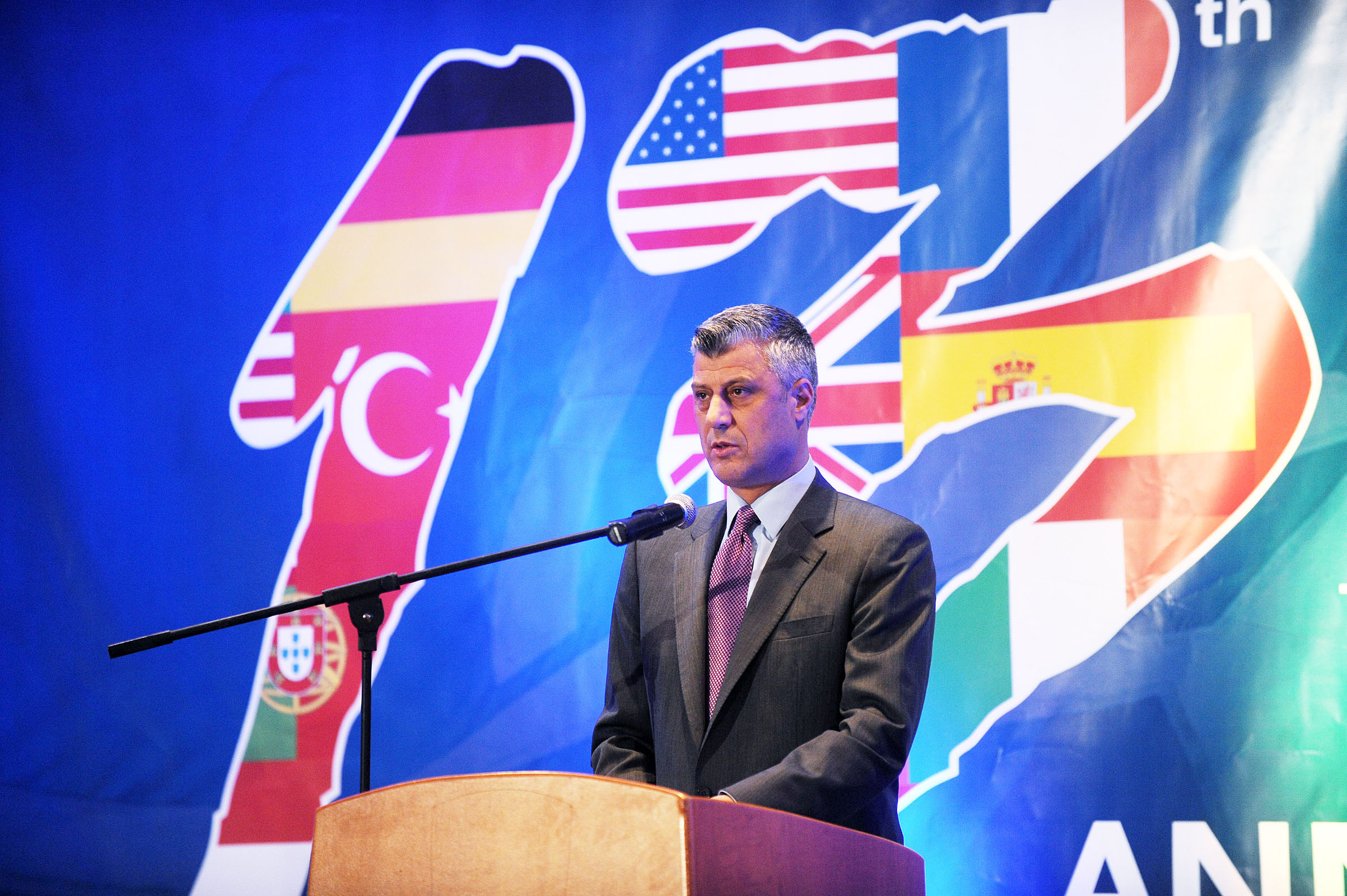Ladies and gentlemen.
After the World War Two a European nation of two million were going through their darkest hours of history.
Milosevic’s dictatorial machinery had been carrying out hegemonist and genocidal wars for over ten years in the former Yugoslav territory.
Millions of Balkan people suffered in the face of his war machinery , never being able to conquer it militarily.
Discrimination on nationality, police ruthlessness, persecution and the killings in Kosovo became a daily affair, particularly during 1990-1999.
In an attempt to finally suppress and destroy the dream of freedom of Kosovo, the Serbian police structures, paramilitary and army units sank deeper in crime by killing 2000 Albanians within 10 years.
The ongoing violence reached its peak in 1998 following military expeditions, going around burning Albanian houses, killing as they went, massacring children, and women, the elderly and innocent men.
Kosovo counteracted this violence with all forms of civil resistance and disobedience.
The Kosovo Liberation Army, a political and military mechanism, was gaining strength and expanding more and more endeavouring the protection of civilians and putting themselves against the Belgrade repressive establishment.
The Serbian Police and military crimes in Qirez and Likoshan, in Prekaz and Recak, and others that followed later, were our cries at the diplomatic and other important democratic centres.
Ladies and gentlemen,
The level of atrocities carried out in Kosovo and the fleeing of a million of its people, shocked Washington and Brussels, Paris, London, Bonn and Rome.
The conciseness of the democratic world, faithful to basic human rights, equality, dignity, peace and democracy, reacted by protecting Kosovo.
It is thanks to the democratic world that the most powerful military force in the world, the North-Atlantic Alliance, NATO, was put in motion in order to protect the people of Kosovo.
In arriving at the moment of commencing bombardments on 24 March 1999 the global diplomacy underwent great challenges and hardships.
Thanks to the United States of America, the Western European countries and the political determination of political leaders of those countries, 13 years ago one of the most successful campaigns of NATO begun, culminating with the surrendering of Milosevic’s military machinery.
Such an achievement, be it political, diplomatic or military, extraordinary merits go to United States of America and the countries of Western Europe, members of NATO.
Today, on the 13th anniversary of the bombings, to all these countries and their governments, and leaders of the time, we express our appreciation, thanks and special gratitude.
At the same time we express our most sincere gratitude to the endless army of military personnel of NATO armies, who went to 78-day battle against Serbian Police and military objectives, with professionalism, courage and heroism.
NATO campaign achieved many results in terms of politics, diplomacy and military.
The true technical dimension was best described by British military historian, John Keegan on ‘The Daily Telegraph’ where he says:
There are certain dates in the history of the warfare that mark real turning points… Now there is a new date to fix on the calendar: June 3, 1999, when the capitulation of President Milosevic proved that war can be won by airpower alone.’
The NATO bombing campaign is of vital importance for Kosovo.
It was even more important than just for humanitarian and regional stability alone.
Ladies and gentlemen,
All strategic objectives of NATO military interventions were achieved: the end of Kosovo war, the expulsion of Serbian police and military outside of Kosovo, the entry of KFOR as an international security force, the return of Kosovo refugees and the beginning of new political life in times of peace.
Thanks to the civil resistance, political and westerly-bound vision of KLA and the NATO intervention, Kosovo got its liberation and beginning of true democratic life.
Kosovo underwent the difficulties of a society coming out of a war, with a clear vision ahead of it.
With the help of supporting countries, Kosovo went through the transition process and building of its legitimate institutions, developing of the democracy and economic growth.
13 years on after the beginning of the NATO air campaign, Kosovo is an independent and sovereign country, recognised by 89 countries.
Today, NATO continues its contribution in Kosovo through training and building of capacities of the Kosovo Security Force, as a professional, modern force, aspiring Kosovo membership to the NATO.
Kosovo is a member of International Monetary Fund, the World Bank and soon the European Bank for Reconstruction and Development.
Kosovo has met all its requirements so this year it can conclude successfully the supervision of independence, a proof of stability and maturity of its legitimate institutions.
Lastly, the European Union with an unanimous decision has enshrined the clear European perspective by launching the feasibility studies that will lead to Stabilisation and Association Agreement between the Republic of Kosovo and the European Union.
Ladies and gentlemen,
Kosovo is a new country, a pillar of peace and stability in the region with a confident NATO and EU perspective.
Thank you!


